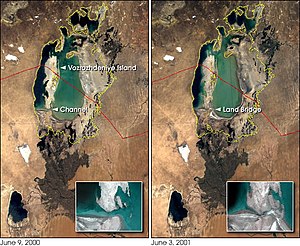沃茲羅日傑尼耶島
| 沃茲羅日傑尼耶島 | |
|---|---|
Ostrov Vozrozhdeniya | |
 | |
| 自然地理 | |
 | |
| 所處海域 | 中亞 |
| 管轄 | |
| 最大聚居地 | 凱圖巴克 |
| 居民 | |
| 人口 | 1,500(1980年代) |

沃茲羅日傑尼耶島(俄語:Остров Возрождения,羅馬化:Ostrov Vozrozhdeniya),亦稱作復活島(Rebirth Island)或復興島(Renaissance Island),系位於中亞鹹海的一座前蘇聯屬原島嶼,自1980年代早期起由哈薩克斯坦和烏茲別克斯坦共同管轄。1954年,一系列代號為Aralsk-7的生物武器試驗場及實驗設施在該地區及其附近的島嶼Komsomolskiy上落成。[1]
地理信息
[編輯]沃茲羅日傑尼耶島原為一座小島,其面積隨着1960年代後鹹海萎縮(主因為蘇聯對河川的過度截流)而逐漸擴大。[2] 由於鹹海持續退縮,該島於2001年中旬與陸地相連成為一個半島。[3]自2008年起,沃茲羅日傑尼耶島已經不再作為一個獨立的地理特徵,直到2010年由於被融雪淹沒南鹹海東部盆地而令本島再度成為一個半島。
歷史
[編輯]1948年,一座絕密生物武器實驗室在此地竣工,用於測試包括炭疽桿菌、伯納特氏立克次體、土拉弗朗西斯桿菌、豬布魯氏桿菌、普氏立克次體、天花病毒(主要)、鼠疫耶爾森氏桿菌、肉毒桿菌毒素和委內瑞拉馬腦炎病毒在內的多種生物戰劑。[4] 1971年1月31日,鹹海天花感染事故爆發,導致10人受到感染,3人病逝。
20世紀90年代後,沃茲羅日傑尼耶島的潛在風險隨着前蘇聯生物武器項目負責人肯·阿里貝等人的叛逃為外界所知。[5]近年解密文件顯示,此地貯存有以炭疽孢子或鼠疫桿菌裝填的彈藥。島上的廢棄城鎮凱圖巴克曾有約1,500名居民,現已荒廢。
1992年,該島上的研究人員已全數撤離。[6]許多用於儲藏孢子的容器未能得到正確的貯存或銷毀,後來有部分容器發生泄漏。
2001年10月22日,美國與烏茲別克斯坦在塔什干簽署下一項初始預算為六百萬美元的協議,內容包括為後者處理努庫斯(Nukus)、沃茲羅日傑尼耶島兩地殘餘的感染性廢棄物及建立監測站的工作提供協助[7]。2002年,通過一項由美國發起與組織、烏茲別克斯坦提供協助的項目,10個炭疽儲存點被徹底消毒。[8]
相關條目
[編輯]- Biopreparat
- 肯·阿利貝克
- 凱圖巴克
- 格魯伊納島,位於蘇格蘭,英國政府曾在島上進行生化武器試驗
參考資料
[編輯]- ^ Dembek, Zygmunt F., Julie A. Pavlin, and Mark G. Kortepeter (2007), “Epidemiology of Biowarfare and Bioterrorism”, Chapter 3 of: Dembek, Zygmunt F. (2007), Medical Aspects of Biological Warfare (頁面存檔備份,存於網際網路檔案館), (Series: Textbooks of Military Medicine), Washington, DC: The Borden Institute, pp 51-52.
- ^ Michael Wines. Grand Soviet Scheme for Sharing Water in Central Asia Is Foundering. The New York Times. 9 December 2002 [29 October 2012]. (原始內容存檔於2017-08-27).
- ^ NASA Visible Earth - “Rebirth” Island Joins the Mainland 網際網路檔案館的存檔,存檔日期2010-05-28., Aral Sea 網際網路檔案館的存檔,存檔日期2010-07-28.
- ^ Tom Mangold; Jeff Goldberg. Plague Wars: The Terrifying Reality of Biological Warfare. Macmillan. 2001: 46–47 [2015-07-19]. ISBN 9780312263799. (原始內容存檔於2016-06-23).
- ^ Hoffman, David. The Dead Hand: The Untold Story of the Cold War Arms Race and Its Dangerous Legacy. Random House. 2009: 460 [2015-07-19]. ISBN 9780385524377. (原始內容存檔於2016-05-05).
- ^ Pala, Christopher (2003), Anthrax Island, The New York Times, January 12, 2003.
- ^ SIPRI Yearbook 2002:Annex B. Chronology 2001
- ^ Powell, Bill. Are We Safe Yet? For all the warnings, there hasn't been another attack. But the hard work of enhancing homeland security has only just begun. Here's what we need to do. CNN. 16 September 2002 [2015-07-19]. (原始內容存檔於2007-11-16).
外部連結
[編輯]- Abandoned Anthrax: Vozrozhdeniye Island. (頁面存檔備份,存於網際網路檔案館) Sometimes Interesting. 29 Nov 2014
- Youtube: Going To Extremes: Voz-Island (Part 1) (頁面存檔備份,存於網際網路檔案館)
- Youtube: Going To Extremes: Voz-Island (Part 2) (頁面存檔備份,存於網際網路檔案館)
- Welcome to Anthrax Island - Guardian Unlimited (頁面存檔備份,存於網際網路檔案館)
- Rebirth Island joins the mainland (2000 and 2001 satellite images) (頁面存檔備份,存於網際網路檔案館)
- NASA satellite image comparison between 1989 and 2003 (頁面存檔備份,存於網際網路檔案館)
- Biological Decontamination of Vozrozhdeniye Island: The U.S.-Uzbek Agreement
- Former Soviet Biological Weapons Facilities in Kazakhstan: Past, Present, and Future (頁面存檔備份,存於網際網路檔案館)
- 1960's Satellite images of Soviet laboratory (頁面存檔備份,存於網際網路檔案館)
- Top Inhospitable Places in the World (頁面存檔備份,存於網際網路檔案館)
